- Home
- Chris Ryan
Outbreak Page 6
Outbreak Read online
Page 6
'Good day?' Ben asked his dad.
Russell nodded. 'It's a rich source of good-quality Coltan. I need another day there, and then we can get back.' He turned to Suliman. 'Thank you for your kindness today,' he said politely. 'Same time tomorrow?'
'My people will be here to collect you.' Suliman bowed slightly, and made to leave.
'Just a minute!' Ben said sharply. 'I want to ask you a question.'
Suliman turned, and Ben felt both men's eyes on him.
'What's making everyone so ill? Why is everyone dying?'
'Ben!' Russell reprimanded. 'I don't want to hear you speaking to our hosts so rudely.'
'It's true, Dad. Every other house in this village has a red cross painted on the door. It means that someone is dying, or has died recently, in that house. We've been brought here without being told – I think we deserve to know what's going on.'
Suliman looked intently at him, his face hard before it suddenly dissolved into a softer smile. 'It's true, Ben,' he whispered, his rasping voice sounding almost snakelike. 'Many of our villagers are sick. You are taking your malaria medication, I hope?'
Ben nodded mutely.
'Good. It has been bad lately. A very vicious strain. The dead are as numerous as those who survive it. Few people can afford the medicine.'
Ben said nothing; malaria was a big problem in the area, that much he knew, and Suliman's explanation had the desperate ring of truth.
'Our people have no option but to accept this as a way of life,' Suliman continued. Then he nodded at Ben and his father in turn. 'Until tomorrow, then,' he said, and left.
There was a silence between Ben and his father, which Russell broke in his quiet voice. 'Now do you understand why I was so insistent that you took your malaria medication before we left?' he asked in that frustratingly smug voice Ben found adults often using with him.
'I suppose so,' Ben muttered. He knew he was being surly, but he couldn't help it. He was beginning to wish he had never come.
CHAPTER SEVEN
Russell Tracey's breathing was heavy, slow and measured. Ben hadn't noticed it the previous night – probably too busy worrying about creepy crawlies in the bedroom, he supposed. He lay drowsily in the darkness listening to it, wishing that he too could be visited by the sleep that had descended on his father.
Gradually, though, he became aware of another sound – a scratching in the courtyard outside. He concentrated on isolating that sound from any others and realized that it was footsteps walking across the dusty, gritty earth. And then he heard a tapping at the door. Three gentle knocks. A pause, and they came again – tap, tap, tap – a little louder this time. Russell's breathing remained heavy – clearly he had been undisturbed by the sound – so Ben climbed out from under his mosquito net and pulled on his clothes. He stepped towards the door before halting, turning back on himself and removing the gun from its place on the table. Then he walked to the door and, his finger nervously caressing the trigger of the gun, gently nudged it open.
The African night was sultry, and for a moment Ben thought he had been hearing things as there appeared to be nobody there. He noticed that he was suddenly breathing as heavily as his father, and he prepared to close the door and get back to the relative comfort of his bed when he saw a figure appearing from the shadows. Whoever it was was walking swiftly towards him and had their finger pressed firmly against their lips. Ben felt a sudden sickness of panic rising in his chest, and he felt his arm bringing the gun up to point in front of him.
It wasn't until the figure was almost upon him that he realized who it was.
Halima stopped in her tracks when she saw the gun pointing towards her, her wide eyes staring fearfully at Ben, who immediately let the weapon drop to his side. 'What are you doing?' he whispered at her.
'Come with me,' Halima breathed.
'Where?'
'I need to show you something.'
Ben thought for a moment. His dad would be furious if he sneaked off again, especially with the gun. But he was asleep, and showed no signs of waking up soon, so Ben decided on a compromise. 'Wait there,' he told Halima, before slipping back inside, placing the weapon in its place on the table, and then returning to see what this mysterious girl wanted with him.
'Come with me,' Halima repeated, and she led him out into the main square.
There was nobody about, but the square itself was almost eerily well-lit by the bright silver light of the waxing moon. 'We need to stay hidden,' Halima told Ben as they skirted quietly round the edge of the square towards the little street where her house was.
'Why?' Ben asked. 'What are we doing? Why did you ignore me earlier on today?' He had so many questions.
'I will explain everything when we get there.' Halima smiled at him a bit apologetically. Suddenly she raised her hand and gestured at him to stop. 'Listen,' she instructed.
Ben stood perfectly still. Somewhere, not too far away, he imagined, he could hear the faint sound of a drum. It played a simple rhythm – three short strokes followed by four quicker ones.
Dum, dum, dum, da-da-da-da.
Halima nodded to herself in approval, then gestured at Ben to follow her. They sneaked down the street, past Halima's house and on towards the clearing where they had been chatting before Suliman had interrupted them. As they moved, the sound of the drumming grew louder, and it seemed to Ben that it had grown a little faster too. Soon enough, they came to the clearing. On the other side of it, obscured by the thicket of dense trees and brush, Ben could make out the glow of a fire. He felt a tingle of apprehension run down his spine as he realized how foolhardy he was being, allowing this girl he barely knew to lead him around surreptitiously like this in the middle of the night. He stretched out and grabbed her lightly by the arm.
'Halima, I'm not going any further until you tell me what this is about.'
Halima looked down at his hand, but Ben did not move it away. 'We can't stay here out in the open,' she told him seriously. 'I am taking you to see a tribal ritual. The village elders would be very angry if they knew I was showing it to a white person. Some things are not allowed.'
Dum, dum, dum, da-da-da-da. The drumming was closer.
Ben nodded. Halima scurried away to the left, with Ben following. Down the side of the clearing was a pathway with a few trees and straggly bushes providing a little camouflage. It wasn't much, but it was something, and they ran as light-footedly as they could towards the foliage, the light and the sound of the drums.
Once they were in the thicket, they could move with less fear of being seen, but Ben soon found that he had to tread more carefully; the sound of dried wood breaking under his feet made his heart stop every time it happened – he was thankful that the drumming, almost frenzied now, was loud enough to disguise what he felt was his terrible clumsiness.
Dum, dum, dum, da-da-da-da.
They came to the edge of small clearing, and Halima stopped, gently resting her hand on Ben's arm to indicate that he should do the same. In the middle of the clearing was a fire – clearly the one that they had seen from a distance – and sitting around it, about twenty metres from where Ben and Halima were hiding, were eight or nine elderly men. They wore simple clothes – dark-coloured all-in-one tunics mostly – but round their necks they wore what looked like heavy ceramic jewellery. Two of them wore headdresses made from the fur of animals. Standing a little way apart from these men was the drummer, bent double over a large wooden djembe drum, intently beating out the increasingly wild rhythm.
Dum, dum, dum, da-da-da-da.
The eyes of all the men were trained on a figure Ben could not see clearly. It was positioned on the other side of the fire, so all he could make out was a silhouette of what appeared to be a man, fairly tall and, as far as Ben could make out, naked, at least from the waist up. He was dancing in time to the rhythm of the drum, not in a wild, frenetic way, but making short, jerky movements.
Ben found himself transfixed by the sinister sight. How long he watched before Halima in
terrupted his trance he could not have said. 'It is a dance for the ancestors,' she told him.
Ben blinked and turned to look at her. 'What?'
'A dance for the ancestors. The man you see dancing has great power.'
'I don't understand,' Ben whispered. 'Who are the ancestors?'
Halima gazed into the middle distance. 'The dead. Those that have gone before us. It is our duty to ensure that they should not be disturbed.'
'What do you mean, disturbed? How can you disturb dead people?'
Halima gave him a sidelong glance. 'You asked me before why everyone seemed so scared of this village.'
Ben nodded. 'I think I'm already beginning to understand,' he said. 'I know what the red crosses on the doors mean. I know that lots of people are dying here.'
'But do you know why?'
'Suliman told me it was malaria. We were warned about it before we left England.'
Halima smiled faintly. 'Malaria.' She nodded. 'Yes. That is what everyone in the village will tell you. But it is not what they believe.'
'But you told me yourself that your parents died from malaria.'
Ben was puzzled, and Halima clearly understood that from the look on his face. 'You have to understand,' she told him quietly, 'that things are not always what they seem to be in Africa. You are a stranger, so people will not always tell you what they really believe.' She was looking at him intently now. 'I have seen many people die, and I nursed my parents to their graves. What killed them was not malaria. Similar, maybe. But not malaria.'
'Then what was it?'
Halima gazed towards the fire once more. 'My father worked in the mine,' she told him. 'When the mine-owners came, people were worried. They wanted to dig near the burial grounds sacred to our ancestors. But there was nobody to stop them, and besides, they offered jobs and money. We are very poor here, and the village elders welcomed them. To start with there was no problem. But not long ago they extended their excavations, and that was when the mine-workers started to fall ill.'
'All of them?' Ben asked, his attention rapt.
Halima shook her head. 'No. Not all of them. My father and two others first. Then my mother.' Her voice was expressionless as she explained what had happened. 'He woke up one morning vomiting and unable to stand up. His head ached so badly that he could barely speak, he was hot all over and I could hear the breath rattling in his chest. He could eat nothing. My mother became ill the following day. They both died on the same night, eight days after my father fell ill.'
'I'm sorry,' Ben breathed, his expression of sympathy seeming desperately inadequate.
'At first I too believed it was malaria. Even after they died I was not sure I wanted to believe what is so obvious to me now. But it cannot be ignored. Two thirds of the men who have gone down the mine have succumbed to the same illness. Of those people, three quarters have died. In addition, certain members of the mine-workers' families have started to succumb. Everyone in the village knows somebody who has died.'
Ben felt a trickle of sweat drip down the side of his face. The night was warm enough as it was, but the fire was sufficiently large for him to feel it against his skin, despite the fact that they were perhaps twenty metres from it. 'Why have you brought me all the way here to tell me this?' he asked, his voice cracking.
Halima nodded towards the scene in front of them. 'What you are watching is a ceremony to appease the ancestors.' She smiled at him again, and Ben noticed for the first time the orange of the fire reflected in her dark eyes. 'You haven't asked me yet how it is that I speak English.'
This was true – it was something that Ben had wondered, but he hadn't yet had the opportunity to ask.
'I have a radio in my house,' Halima explained, 'one that I listen to as often as possible. There is much to be learned from your World Service.'
Ben remained silent – it wasn't something he had ever listened to.
'So I know something about your culture. No doubt you think that these ideas are stupid. I brought you here to show you how deeply my people believe in them. And to urge you, if you value your life, to leave this place as soon as possible. It is cursed.'
C'est maudit. It was not the first time somebody had told him this.
Ben looked fearfully back at the ceremony. There was no denying that these people certainly looked as if they were taking it extremely seriously. The beating of the drum was more frenzied than ever now, and the village elders seemed to be in a trance-like state of intense concentration. All eyes were fixed on the jerking movements of the silhouetted dancer. Ben suppressed a shudder – here in the darkness of the African night, what Halima was telling him seemed far from improbable. 'So the man dancing,' he whispered, 'is he a-?'
'Yes,' Halima interrupted. 'He is what you would call a witch doctor, but it is not a word we would use. To us he is a healer, and tonight he is trying to heal the rift that exists between the villagers and the ancestors.'
As she spoke, and as though drawn to them by his discussion, the dancer traced the course of a semicircle round the fire. As he came into the light, Ben became aware of his own breath, heavy and trembling. The healer was tall and bony, his skin bare apart from a short cloth skirt. Round his neck he wore colourful beads, and the top of his head was covered by an intricate headdress made of feathers and other things that Ben could not make out.
But it was not his attire that commanded attention; it was his face.
The skin was impossibly wrinkled, so much so that it barely seemed human. Occasionally he would open his mouth into a sinister rictus grin; even from a distance Ben could see that his teeth, such as they were, were bent and decayed. It was the eyes, though, that Ben knew he would never forget. They rolled in their sockets like marbles spinning across the floor; they were yellow and bloodshot.
And then, suddenly, they were looking directly at him.
He shouted a harsh, monosyllabic word and immediately the drumming stopped. The healer raised his arm and pointed precisely in the direction of where Ben and Halima were hiding; as he did so, Ben heard his companion gasp, and then forcefully whisper a single word: 'Run!'
The two of them turned and sprinted their way back through the thicket, all pretence of secrecy obliterated by their blind panic. As he ran, Ben felt a sharp branch whip across one side of his face; it stung, and there was the telltale feeling of moistness on his cheek that told him he had been cut, but he couldn't let it slow him down any more than he could risk looking behind to see if he was being chased. Halima ran by his side – they were well matched in terms of speed – and soon they found themselves at the treelined pathway down which they had sneaked only ten minutes before. Now they hurtled up it like their lives depended on it. Ben didn't even fully know what he was running from; he only knew that it was the right thing to do.
As they neared the other end of the pathway, Ben allowed himself a quick glance over his shoulder. There appeared to be no one behind them, although it was difficult to be sure in the darkness, and he felt the tension that had been spurring him on dissipate a little. He turned his head back round to the front and then, along with Halima, came to a sudden, abrupt halt.
Because there, standing in front of them, his arms crossed and his face unreadable, was Suliman.
The two friends stood, wide-eyed and out of breath, in front of him. He looked first at Halima, and then at Ben. 'It is very late for you to be out, Ben,' he rasped.
Ben said nothing as he held his head high, doing his best to exude a confidence he did not feel.
'I think it is time for you to return to your compound,' Suliman insisted. Then he turned his attention to Halima, saying something abruptly to her in Kikongo, and gesturing that she should come with him. Halima shook her head and took a step backwards. Suliman made as if to approach her, but he was blocked by Ben, who had moved between him and his new friend.
'I'll take her home,' he said.
Suliman's gaze remained level as he considered his response. Finally he smiled – an unplea
sant smile – and stepped out of his way. 'I think that would be a very good idea,' he replied, before barking something again at Halima. She lowered her eyes to the ground; as she did so, Ben took her hand and led her away.
They wanted to run, but something forced them both to walk briskly and in silence, feeling Suliman's eyes burn into their backs as they went. It was not until minutes later when they found themselves in Halima's street that Ben allowed himself to look back.
There was nobody in sight.
'Are you OK?' he asked.
Halima nodded.
'What did he say to you? Before we left, I mean.'
'He said,' Halima replied slowly, 'that he would deal with me in the morning.'
Ben felt his lips tighten. 'You can come and stay with us if you want.'
Halima shook her head. 'No. I don't believe he will disturb me tonight.' She looked back over her shoulder. 'That man has never liked me. They made him mine manager only recently, after the previous one died. Before that he was nobody. No one can understand why they put him in charge.' She made a brave attempt to smile. 'I can lock my door from the inside,' she assured him. 'I'll see you tomorrow, Ben Tracey.'
She turned to open the door. 'Wait!' Ben interrupted her. What she had just said about Suliman had crystallized a question in his mind.
Halima threw him a quizzical glance.
'There's something I don't understand. If the mine is cursed, why don't all the mine-workers die?'
The girl raised one eyebrow. As she did so, she unbuttoned the top of the colourful blouse she was wearing and pulled out a necklace. She held it up to Ben. It bore two tokens: the one that Fatima had sent, and another – smaller but with the same design. 'I am not the only one who has asked for protection,' she whispered. And with that, she opened the door and slipped inside.
Ben waited until he heard the click of the lock before walking quickly and nervously back to his own bed.
CHAPTER EIGHT
Ben's head spun for what seemed like hours, and he lay there turning the events of the evening over in his mind and listening to his father's heavy breathing; but sometime before morning, sleep overcame him.

 Global Strike
Global Strike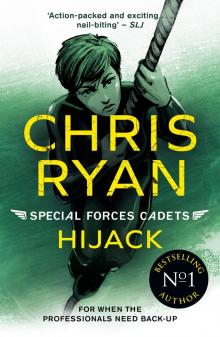 Hijack
Hijack Special Forces Cadets 2
Special Forces Cadets 2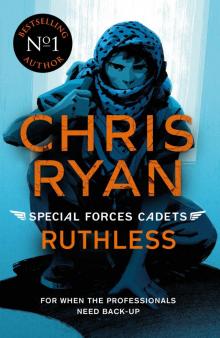 Ruthless
Ruthless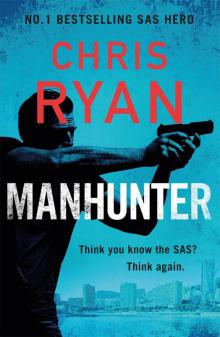 Manhunter
Manhunter Special Forces Cadets 1
Special Forces Cadets 1 Red Strike
Red Strike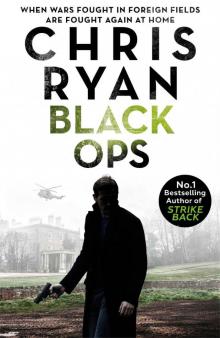 Black Ops
Black Ops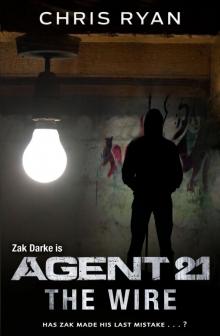 Agent 21: The Wire
Agent 21: The Wire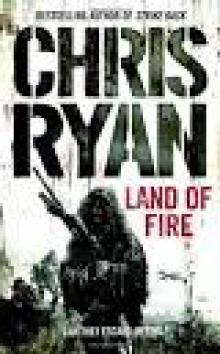 Land of Fire
Land of Fire Alpha Force: Fault Line
Alpha Force: Fault Line Under Cover (Agent 21)
Under Cover (Agent 21)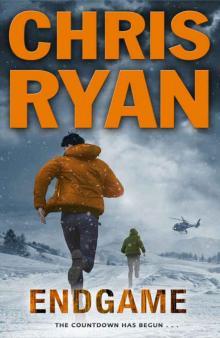 Endgame (Agent 21)
Endgame (Agent 21) Red Centre
Red Centre Blackout
Blackout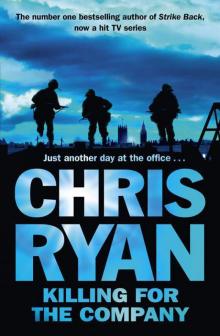 Killing for the Company
Killing for the Company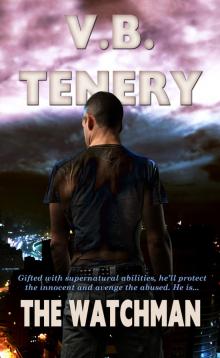 The Watchman
The Watchman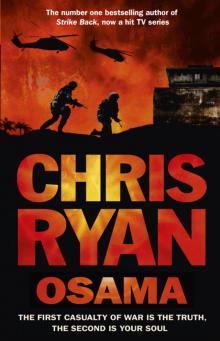 Osama
Osama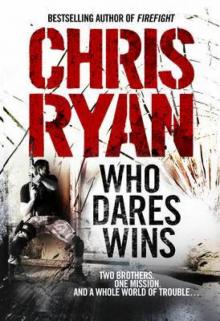 Who Dares Wins
Who Dares Wins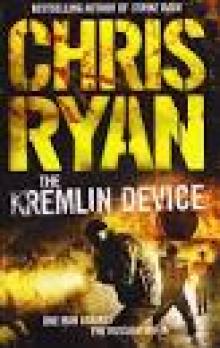 The Kremlin Device
The Kremlin Device Hunter Killer
Hunter Killer Alpha Force: Untouchable
Alpha Force: Untouchable Stand By Stand By
Stand By Stand By Chris Ryan Extreme: Hard Target: Mission Four: Fallout
Chris Ryan Extreme: Hard Target: Mission Four: Fallout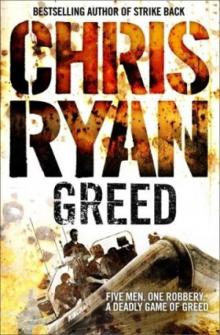 Greed mb-1
Greed mb-1 Alpha Force: Desert Pursuit
Alpha Force: Desert Pursuit Strike Back
Strike Back Greed
Greed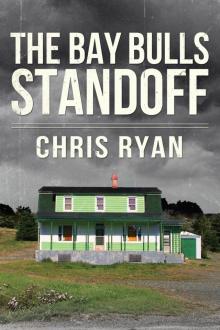 The Bay Bulls Standoff
The Bay Bulls Standoff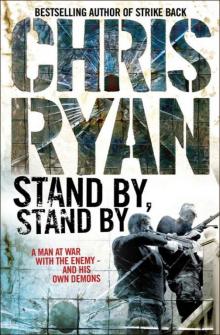 Stand By, Stand By gs-1
Stand By, Stand By gs-1 Outbreak
Outbreak Hunted
Hunted Vortex cr-4
Vortex cr-4 Rat-Catcher
Rat-Catcher Vortex
Vortex Bad Soldier
Bad Soldier Shadow Kill: A Strikeback Novel
Shadow Kill: A Strikeback Novel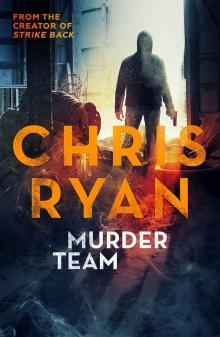 Murder Team (Kindle Single)
Murder Team (Kindle Single) One Good Turn
One Good Turn Flash Flood cr-1
Flash Flood cr-1 Night Strike
Night Strike Wildfire
Wildfire Agent 21: Reloaded: Book 2
Agent 21: Reloaded: Book 2 Chris Ryan Extreme: Hard Target: Mission Two: The Rock
Chris Ryan Extreme: Hard Target: Mission Two: The Rock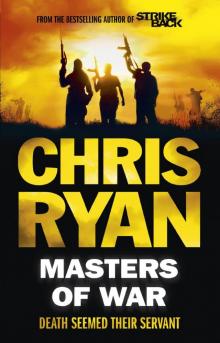 Masters of War
Masters of War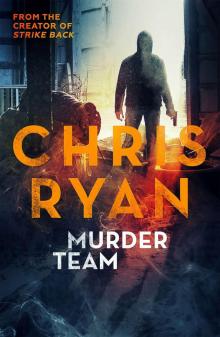 Murder Team
Murder Team War Dog
War Dog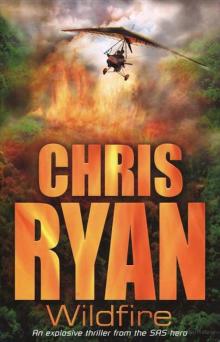 Wildfire cr-2
Wildfire cr-2 Survival
Survival The One That Got Away - Junior edition
The One That Got Away - Junior edition The Hit List
The Hit List The Kill Zone
The Kill Zone Medal of Honor
Medal of Honor Battleground
Battleground Twister
Twister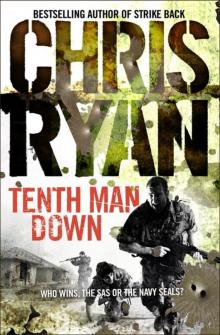 Tenth Man Down gs-4
Tenth Man Down gs-4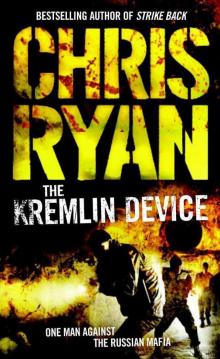 The Kremlin Device gs-3
The Kremlin Device gs-3 Hostage
Hostage Bad Soldier: Danny Black Thriller 4
Bad Soldier: Danny Black Thriller 4 Alpha Force: Blood Money
Alpha Force: Blood Money Firefight
Firefight Chris Ryan Extreme: Hard Target: Mission One: Redeemer
Chris Ryan Extreme: Hard Target: Mission One: Redeemer Hit List
Hit List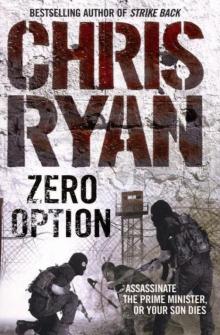 Zero Option gs-2
Zero Option gs-2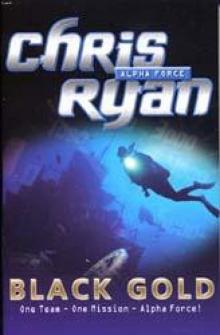 Black Gold
Black Gold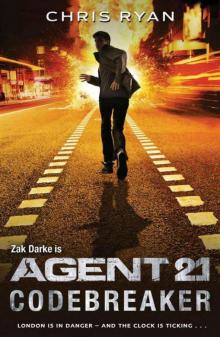 Agent 21: Codebreaker: Book 3
Agent 21: Codebreaker: Book 3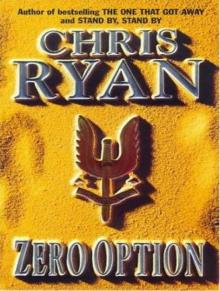 Zero Option
Zero Option Ultimate Weapon
Ultimate Weapon Tenth Man Down
Tenth Man Down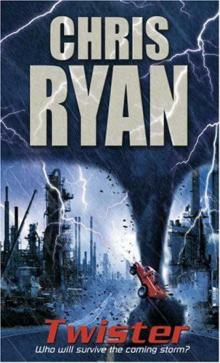 Twister cr-5
Twister cr-5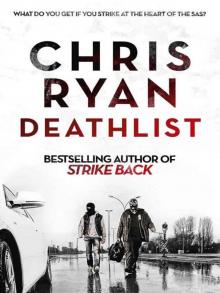 Deathlist
Deathlist Hellfire
Hellfire Flash Flood
Flash Flood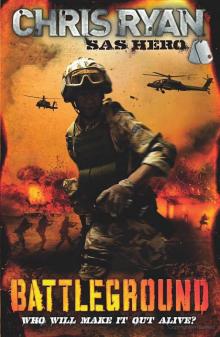 Battleground cr-6
Battleground cr-6 The Increment
The Increment